materiali






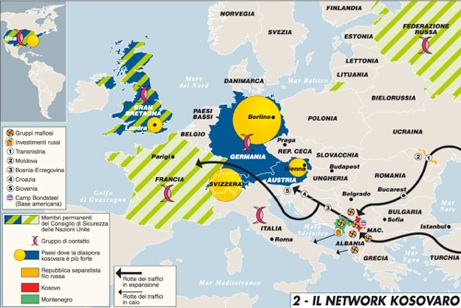
Kosovo has since become a transit point for drugs, channelled from Asia to Europe.
A Serbian military analyst and an authoritative expert on the situation in Kosovo, Milovan Drecun says that, according to the Europol and Interpol, the largest amount of heroin is delivered to Europe from Afghanistan via Kosovo. According to some estimates, some 65% of all the world’s heroin is channeled through the former Serbian province; while 90% of all drugs that reach Europe are shipped via Kosovo.
According to the Canadian detective Stewart Kellock, the Albanian drug mafia operates with the connivance of the United States. Mr. Kellock said in an interview that US diplomats prevent the detention in Kosovo of notorious drug traffickers.
The Canadian detective also confirmed that Kosovo’s current Prime Minister Hashim Thaci leads the biggest Albanian mafia clan.
da ‘The voice of Russia’ Jun 5, 2010 12:01 Moscow Time
__________
Gangsta State: Kosovo's Drugs, Slaves, and Organ Farms
Details Published Date Written By Tom Burghardt Category: Opinion
Mafia State: Kosovo's Prime Minister Accused of
Running Human Organ, Drug Trafficking Cartel
by Tom Burghardt l
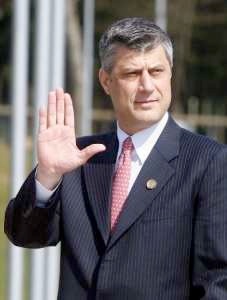
In another grim milestone for the United States and NATO, the Council of Europe (COE) released an explosive report last week, "Inhuman treatment of people and illicit trafficking in human organs in Kosovo."
The report charged that former Kosovo Liberation Army (KLA) boss and current Prime Minister, Hashim Thaçi, "is the head of a 'mafia-like' Albanian group responsible for smuggling weapons, drugs and human organs through eastern Europe," The Guardian disclosed.
According to a draft resolution unanimously approved December 16 in Paris, the Committee on Legal Affairs and Human Rights found compelling evidence of forced disappearances, organ trafficking, corruption and collusion between criminal gangs and "political circles" in Kosovo who just happen to be close regional allies of the United States.
The investigation was launched by Dick Marty, the Parliamentary Assembly for the Council of Europe (PACE) special rapporteur for human rights who had conducted an exhaustive 2007 probe into CIA "black fights" in Europe. The PACE investigation gathered steam after allegations were published by former chief prosecutor of the International Criminal Tribunal for the Former Yugoslavia (ICTY), Carla Del Ponte in her 2008 memoir.
After it's publication, Ms. Del Ponte was bundled off to Argentina by the Swiss government as her nation's ambassador. Once there, the former darling of the United States who specialized in doling out victor's "justice" to the losers of the Balkan wars, was conveniently silenced.
A series of damning reports by the Center for Investigative Journalism (CIR), the Balkan Investigative Reporting Network (BIRN) and the BBC, confirmed Del Ponte's allegations and spurred the Council to act.
Reporting for the BBC, investigative journalist Michael Montgomery learned that political opponents of the KLA and Serb prisoners of war "simply vanished without a trace" into a secret prison "in the Albanian border town of Kukes."
According to sources who feared for their lives, including former KLA guerrillas, the BBC revealed that disappeared civilians "were Serbs and Roma seized by KLA soldiers and were being hidden away from Nato troops. The source believes the captives were sent across the border to Albania and killed."
In an uncanny echo of Nazi practices during the period of the Third Reich, The New York Timesreported that "captives" were "'filtered' for their suitability as donors, based on sex, age, health conditions and ethnic origin. "We heard numerous references to captives' not merely having been handed over, but also having been 'bought' and 'sold,'" the special rapporteur told the Times.
"Some of the guards told investigators," the Times reports, "that a few captives understood what was about to happen and 'pleaded with their captors to be spared the fate of being chopped into pieces'."
Mercy was in short supply however, behind KLA lines.
The report states: "As and when the transplant surgeons were confirmed to be in position and ready to operate, the captives were brought out of the 'safe house' individually, summarily executed by a KLA gunman, and their corpses transported swiftly to the operating clinic."
Once organs were removed from the victims they were auctioned off to the highest bidder and sold by a global trafficking ring still operating today.
The former prosecutor further alleged, The Guardian reported, that "she had been prevented from investigating senior KLA officials" who she claimed had "smuggled captive Serbs across the border into Albania, where their organs were harvested."
In a classic case of covering-up the crimes of low-level thugs to protect more powerful criminals, Del Ponte has charged that forensic evidence gathered by ICTY investigators at one of the northern Albania death houses was destroyed at The Hague.
International Network
This brisk underground trade didn't end in 1999 however, when the break-away Serb province was occupied by NATO troops; on the contrary, operations expanded and grew even more profitable as Kosovo devolved into a protectorate of the United States.
In fact, a trial underway in Pristina has revealed that "desperate Russians, Moldovans, Kazakhs and Turks were lured into the capital 'with the false promise of payments' for their kidneys," The Guardian reported.
It was a "growth industry" that fed on human misery. According to The Guardian, recipients "paid up to €90,000 (£76,400) for the black-market kidneys [and] included patients from Canada, Germany, Poland and Israel," EU prosecutor Jonathan Ratel told the British paper.
"Donors" however, were left holding the bag, lucky to escape with their lives.
At the center of the scandal is the Medicus clinic. Located some six miles from downtown Pristina, Medicus was allegedly founded by university hospital urologist Dr Lutfi Dervishi, and a former permanent secretary of health, prosecutors claim, provided the clinic with a false license to operate.
Two of the accused, The Guardian revealed, "are fugitives wanted by Interpol: Moshe Harel, an Israeli said to have matched donors with recipients, and Yusuf Sonmez, perhaps the world's most renowned organ trafficker."
Prosecutors believe that Harel and Sonmez are the brains behind Medicus and that Shaip Muja, a former KLA "medical commander" who was based in Albania, may have overseen operations at the "clinic."
Muja remains a close confidante of Thaçi's and, in an macabre twist, he is currently "a political adviser in the office of the prime minister, with responsibility for health," The Guardian reports.
Investigators averred they had "uncovered numerous convergent indications of Muja's central role [in] international networks, comprising human traffickers, brokers of illicit surgical procedures, and other perpetrators of organised crime."
Besides lining the pockets of Albanian, Israeli and Turkish criminals who ran the grisly trafficking ring, whose interests might also be served in covering-up these horrific crimes?
A Gangster State, but which One?
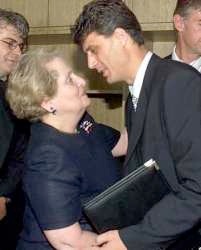
The veil of secrecy surrounding KLA atrocities could not have been as complete as it was without the intervention of powerful actors, particularly amongst political and military elites in Germany and the United States who had conspired with local gangsters, rebranded as "freedom fighters," during the break-up of Yugoslavia.
Prime Minister, Hashim Thaçi: Dazzling Madeleine Albright back in the day.
As in Albania years before NATO's Kosovo adventure, organized criminal activities and "the trade in narcotics and weapons [were] allowed to prosper," Michel Chossudovsky wrote, because "the West had turned a blind eye."
These extensive deliveries of weapons were tacitly permitted by the Western powers on geopolitical grounds: both Washington and Bonn had favoured (although not officially) the idea of a 'Greater Albania' encompassing Albania, Kosovo and parts of Macedonia. Not surprisingly, there was a 'deafening silence' on the part of the international media regarding the Kosovo arms-drugs trade. ("The Criminalization of Albania," in Masters of the Universe? NATO's Balkan Crusade, ed. Tariq Ali, London: Verso, 2000, pp. 299-300)
The consequences of this "deafening silence" remain today. Both in terms of the misery and impoverishment imposed on Kosovo's citizens by the looting of their social property, particularly the wholesale privatization of its mineral wealth which IMF economic "reforms" had spawned, and in the political cover bestowed upon Pristina's gangster regime by the United States.
In the intervening years NATO's "blind eye" has morphed into something more sinister: outright complicity with their Balkan protégés.
Virtually charging the ICTY with knuckling under to political pressure from the Americans, the PACE report states that "the ICTY, which had started to conduct an initial examination on the spot to establish the existence of traces of possible organ trafficking, dropped the investigation."
"The elements of proof taken in Rripe, in Albania" during that initial inquiry investigators wrote, "have been destroyed and cannot therefore be used for more detailed analyses. No subsequent investigation has been carried out into a case nevertheless considered sufficiently serious by the former ICTY Prosecutor for her to see the need to bring it to public attention through her book."
This is hardly surprising, considering that the ICTY was created at the insistence of the Clinton administration precisely as a retributive hammer to punish official enemies of the U.S.
Hailed as an objective body by media enablers of America's imperial project, with few exceptions, while it relentlessly hunted down alleged Serbian war criminals--the losers in the decade-long conflagration--it studiously ignored proxy forces, including the KLA, under the operational control of German and American intelligence agencies.
The report averred that human organ trafficking was only a part of a larger web of crime and corruption, and that murder, trafficking in women, control over global narcotics distribution and money laundering networks were standard operating procedure for Thaçi and other members of the "Drenica group," the black widows at the center of the KLA spiders' web.
For his part, Thaçi has called the PACE report "libelous" and the Kosovo government has repudiated the Council's findings claiming that the charges "were not based on facts and were construed to damage the image of Kosovo and the war of the Kosovo Liberation Army."
While one can easily dismiss prevarications from Kosovo's government, the White House role in covering-up the crimes of their client regime should have provoked a major scandal. That it didn't only reveals the depths of Washington's own venal self-interest in preventing this sordid affair from gaining traction.
In all likelihood fully-apprised of the Council of Europe's investigation through any number of American-friendly moles implanted in European institutions as WikiLeaks Cablegate files have revealed, last summer Thaçi met with U.S. Vice President Joseph Biden at the White House.
Shamelessly, Biden "reaffirmed the United States' full support for an independent, democratic, whole, and multi-ethnic Kosovo," and "reiterated the United States' firm support for Kosovo's sovereignty and territorial integrity," according to a White House press release.
Indeed, the vice president "welcomed the progress that Kosovo's government has made in carrying out essential reforms, including steps to strengthen the rule of law."
An all too predictable pattern when one considers the lawless nature of the regime in Washington.
The Heroin Trail
As I reported more than two years ago in "Welcome to Kosovo! The World's Newest Narco State," the KLA served as the militarized vanguard for the Albanian mafia whose "15 Families" control virtually every facet of the Balkan heroin trade.
Albanian traffickers ship heroin originating exclusively from Central Asia's Golden Crescent. At one end lies America's drug outpost in Afghanistan where poppy is harvested for processing and transshipment through Iran and Turkey; as morphine base it is then refined into "product" for worldwide consumption. From there it passes into the hands of the Albanian syndicates who control the Balkan Route.
As the San Francisco Chronicle reported back in 1999, "Kosovars were the acknowledged masters of the trade, credited with shoving aside the Turkish gangs that had long dominated narcotics trafficking along the Balkan Route, and effectively directing the ethnic Albanian network."
As the murdered investigative journalist Peter Klebnikov reported in 2000 for Mother Jones, as the U.S.-sponsored war in Kosovo heated up, "the drug traffickers began supplying the KLA with weapons procured from Eastern European and Italian crime groups in exchange for heroin. The 15 Families also lent their private armies to fight alongside the KLA. Clad in new Swiss uniforms and equipped with modern weaponry, these troops stood out among the ragtag irregulars of the KLA. In all, this was a formidable aid package."
Despite billions of dollars spent on failed interdiction efforts, these patterns persist today as more than 106 metric tons of heroin flow into Europe. So alarmed has the Russian government become over the flood of heroin penetrating their borders from Central Asian and the Balkan outposts that some officials have likened it to American "narco-aggression" and a new "opium war, researcher Peter Dale Scott reported.
Scott avers: "These provinces" in Afghanistan, "support the past and present CIA assets in the Karzai regime (headed by Hamid Karzai, a former CIA asset), including the president’s brother Ahmed Wali Karzai, an active CIA asset, and Abdul Rashid Dostum, a former CIA asset. In effect America has allied itself with one drug faction in Afghanistan against another." Much the same can be said for CIA assets in Pristina.
As the United Nations Office on Drugs and Crime (UNODC) published in their 2010 World Drug Report:
Once heroin leaves Turkish territory, interception efficiency drops significantly. In the Balkans, relatively little heroin is seized, suggesting that the route is exceedingly well organized and lubricated with corruption. ... Another notable feature of the Balkan route is that some important networks have clan-based and hierarchically organized structures. Albanian groups in particular have such structures, making them particularly hard to infiltrate. This partially explains their continued involvement in several European heroin markets. Albanian networks continue to be particularly visible in Greece, Italy and Switzerland. Italy is one of the most important heroin markets in Europe, and frequently identified as a base of operation for Balkan groups who exploit the local diaspora. According to WCO seizure statistics, Albanians made up the single largest group (32%) of all arrestees for heroin trafficking in Italy between 2000 and 2008. The next identified group was Turks followed by Italians and citizens of Balkan countries (Bulgaria, Kosovo/Serbia, the former Yugoslav Republic of Macedonia and to some extent Greece). A number of Pakistani and Nigerian traffickers were arrested in Italy as well.
As has been documented for decades, U.S. destabilization programs and covert operations rely on far-right provocateurs and drug lords (often interchangeable players) to facilitate the dirty work. Throughout its Balkan campaign the CIA made liberal use of these preexisting narcotics networks to arm the KLA and then provide them with targets.
When NATO partners Germany and the U.S. decided to drive a stake through Yugoslavia's heart during the heady days of post-Cold War triumphalism, their geopolitical strategy could not have achieved "success" without the connivance, indeed active partnership forged amongst Yugoslavia's nationalist rivals. As investigative journalist Misha Glenny has shown,
Most shocking of all, however, is how the gangsters and politicians fueling war between their peoples were in private cooperating as friends and close business partners. The Croat, Bosnian, Albanian, Macedonian, and Serb moneymen and mobsters were truly thick as thieves. They bought, sold, and exchanged all manner of commodities, knowing that the high levels of personal trust between them were much stronger than the transitory bonds of hysterical nationalism. They fomented this ideology among ordinary folk in essence to mask their own venality. As one commentator described it, the new republics were ruled by "a parastate Cartel which had emerged from political institutions, the ruling Communist Party and its satellites, the military, a variety of police forces, the Mafia, court intellectuals and with the president of the Republic at the center of the spider web...Tribal nationalism was indispensable for the cartel as a means to pacify its subordinates and as a cover for the uninterrupted privatization of the state apparatus. (McMafia: A Journey Through the Global Criminal Underworld, New York: Alfred A. Knopf, 2008, p. 27)
Thaçi and other members of his inner circle, Marty avers, were "commonly identified, and cited in secret intelligence reports," published by the German secret state agency, the Bundesnachrichtendienst or BND "as the most dangerous of the KLA's 'criminal bosses'."
Trading on American protection to consolidate political power, thus maintaining control over key narcotics smuggling corridors, the special rapporteur writes that "having succeeded in eliminating, or intimidating into silence, the majority of the potential and actual witnesses against them (both enemies and erstwhile allies), using violence, threats, blackmail, and protection rackets," Thaçi's Drenica Group have "exploit[ed] their position in order to accrue personal wealth totally out of proportion with their declared activities."
Indeed, multiple reports prepared by the U.S. DEA, FBI, the BND, Italy's SISMI, Britain's MI6 and the Greek EYP intelligence service have stated that Drenica Group members "are consistently named as 'key players' in intelligence reports on Kosovo's mafia-like structures of organised crime."
As the Council of Europe and investigative journalists have documented, northern Albania was the site not only of KLA training camps but of secret detention centers where prisoners of war and civilian KLA opponents were executed and their organs surgically removed and sold on the international black market.
"The reality is that the most significant operational activities undertaken by members of the KLA--prior to, during, and in the immediate aftermath of the conflict--took place on the territory of Albania, where the Serb security forces were never deployed."
The report avers, "It is well established that weapons and ammunition were smuggled into parts of Kosovo, often on horseback, through clandestine, mountainous routes from northern Albania," the site of secret NATO bases, "yet only in the second half of 1998," Marty writes, "through explicit endorsements from Western powers, founded on strong lobbying from the United States, did the KLA secure its pre-eminence in international perception as the vanguard of the Kosovar Albanian liberation struggle."
"What is particularly confounding" Marty writes, "is that all of the international community in Kosovo--from the Governments of the United States and other allied Western powers, to the EU-backed justice authorities--undoubtedly possess the same, overwhelming documentation of the full extent of the Drenica Group's crimes, but none seems prepared to react in the face of such a situation and to hold the perpetrators to account."
While the special rapporteur's outrage is palpable, the ascension of a political crime family with deep roots in the international drugs trade and other rackets, including the grisly traffic in human organs, far from being an anomalous event conforms precisely to the structural pattern of capitalist rule in the contemporary period.
"What we have uncovered" Marty informs us, "is of course not completely unheard-of. The same or similar findings have long been detailed and condemned in reports by key intelligence and police agencies, albeit without having been followed up properly, because the authors' respective political masters have preferred to keep a low profile and say nothing, purportedly for reasons of 'political expediency'. But we must ask what interests could possibly justify such an attitude of disdain for all the values that are invariably invoked in public?"
Marty need look no further for an answer to his question than to the "political masters" in Washington, who continue to cover-up not only their own crimes but those of the global mafias who do their bidding.
As we have seen throughout the latter half of the 20th century down to the present moment, powerful corporate and financial elites, the military and intelligence agencies and, for lack of a better term, "normal" governmental institutions are suborned by the same crooked players who profit from war and the ensuing chaos it spawns to organize crime, thereby "rationalizing" criminal structures on more favorable terms for those "in the loop."
In this regard, the impunity enjoyed up till now by Thaçi and his minions merely reflect the far-greater impunity enjoyed by the American secret state and the powerful actors amongst U.S. elites who have profited from the dirty work allegedly performed by Kosovo's Prime Minister, and others like him, who are counted amongst the most loyal servants of imperial power.
Tom Burghardt is a researcher and activist based in the San Francisco Bay Area.. He is the editor of Police State America: U.S. Military "Civil Disturbance" Planning, distributed by AK Press and has contributed to the new book from Global Research, The Global Economic Crisis: The Great Depression of the XXI Century.
____
Kosovo: The US and the EU support a Political Process linked to Organized Crime
Kosovo Prime Minister Hashim Thaci is part of a criminal syndicate
Global Research, February 12, 2008
12 February 2008
Our orientations are clear. The building of the state of Kosova, economic development, economic and social well-being and rigorous measures against corruption, organized crime and negative behavior, so we can have improved security and integrate Kosova into European Union structures.
(Hashim Thaci, chairman of the Democratic Party of Kosovo (PDK), Prime Minister of the Kosovo provisional government, former KLA leader and known criminal)
The PDK, led by Hashim Thaci, former Kosovan Liberation Army commander, took control of many municipalities after the war. The party has close links with organized crime in the province. (The Observer, 29 October 2000)
Mr. Thaci, nicknamed “the Snake” during his KLA days, is a sharp-suited 32-year-old former rebel commander with poor oratory skills, links to organized crime and a determination to preserve relations between his party and the United States (The Scotsman, 20 October 2000)

I know a terrorist when I see one and these men are terrorists,” (US Special Envoy and Ambassador Robert Gelbard)
“The KLA [formerly headed by Hashim Thaci] is tied in with every known Middle and Far Eastern drug cartel. Interpol, Europol, and nearly every European intelligence and counter-narcotics agency has files open on drug syndicates that lead right to the KLA,…” (Michael Levine former official of the US Drug Enforcement Administration (DEA))
Hashim Thaci founded the “Drenica-Group” an underground organization that is estimated to have controlled between 10% and 15% of all criminal activities in Kosovo (smuggling arms, stolen cars, oil, cigarettes and prostitution). Wikipedia The Free Encyclopedia
The US, the EU and the UN are supporting a Kosovo government headed by a known criminal, Prime Minister Hashim Thaci.
The position of Prime Minister was created under the “Provisional Institutions of Self-Government (PISG)” established by the United Nations Interim Administration Mission in Kosovo (UNMIK)
Under UN mandate, the purpose of the provisional government was “to provide ‘provisional, democratic self-government’ in advance of a decision on the political status of Kosovo.
What this signifies is that the United Nations has not only set the stage for an “Independent” Kosovo government in violation of international law, it has also installed a Kosovo government integrated by the members of a criminal syndicate. All three Kosovo Prime Ministers, Ramush Haradinaj, Agim Ceku and Hashim Thaci are war criminals.
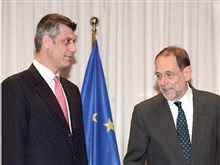
Hashim Thaci and EU Secretary-General Javier Solana
The Kosovo Democratic Party headed by former KLA Commander Hashim Thaci is essentially an outgrowth of the former Kosovo Liberation Army.
US-NATO covert support the KLA goes back to the mid-1990s. In the year preceding the 1999 bombing of Yugoslavia, the KLA was quite openly supported by the Clinton administration.
KLA leader Hashim Thaci was a protégé of Madeleine Albright. He was chosen by Albright to play a key role on Washington’s behalf at the 1998 Rambouillet negotiations. .
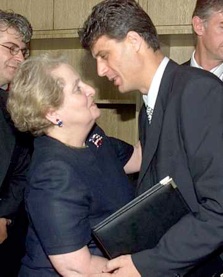
Madeleine and Hashim
The links of the KLA to organized crime have been documented by Interpol and the US Congress. The Washington Times in an article published in May 1999 describes the KLA and its links to the Clinton administration as follows:
Some members of the Kosovo Liberation Army [headed by the current Kosovo Prime minister Hashim Thaci] , which has financed its war effort through the sale of heroin, were trained in terrorist camps run by international fugitive Osama bin Laden — who is wanted in the 1998 bombing of two U.S. embassies in Africa that killed 224 persons, including 12 Americans.
The KLA members, embraced by the Clinton administration in NATO’s 41-day bombing campaign to bring Yugoslav President Slobodan Milosevic to the bargaining table, were trained in secret camps in Afghanistan, Bosnia-Herzegovina and elsewhere, according to newly obtained intelligence reports.
The reports also show that the KLA has enlisted Islamic terrorists — members of the Mujahideen –as soldiers in its ongoing conflict against Serbia, and that many already have been smuggled into Kosovo to join the fight. ….
The intelligence reports document what is described as a “link” between bin Laden, the fugitive Saudi millionaire, and the KLA –including a common staging area in Tropoje, Albania, a center for Islamic terrorists. The reports said bin Laden’s organization, known as al-Qaeda, has both trained and financially supported the KLA. (Washington Times, May 4, 1999, see complete article below)
The Christian Science Monitor in an August 14, 2000 report describes the criminal network controlled by Thaci:
UN police suspect that much of the violence and intimidation has come from former KLA members, especially those allied with Hashim Thaci, the former KLA leader and head of the Democratic Party of Kosovo, one of the KLA’s political offshoots.
In one recent incident, the shop of an LDK activist in Mr. Thaci’s home village was sprayed with automatic gunfire - the second such attack since November.
Thaci’s party potentially has much to lose in the elections, which are for municipal offices only. After Serb forces withdrew last year, the KLA occupied town halls and public institutions across Kosovo and set up its own provincial government.
Although the UN has gradually asserted its own authority and placed representatives of other political groups in local governments, in places like Srbica ex-KLA members affiliated with Thaci’s party still exercise virtual complete control.
“These guys are not going to give up power that easily,” says Dardan Gashi, a political analyst with the International Crisis Group, a US-based research organization with an office in Pristina.
UN police also suspect organized crime is involved in some of the violence. They say that criminal groups engaged in racketeering, smuggling, and prostitution rely on close links to some people in power. The prospect of losing these connections – and the income they generate – may make them ill-disposed toward the LDK.
Officials say the problem is the worst in the Drenica region of Kosovo, the KLA’s heartland and a stronghold of Thaci’s party. Srbica, where Koci is the local LDK president, is one of the main towns in Drenica. (emphasis added)
The Heritage Foundation: Support the KLA-KDP, despite its Criminal Connections
The Heritage Foundation in a May 1999 report acknowledges that the KLA is a criminal organization. It nonetheless called for the support of the KLA by the Clinton administration:
Should the U.S. harness the KLA’s military potential against Milosevic’s brutal regime, despite the KLA’s unusual ideological roots and apparent ties to organized crime? … The KLA does not represent every group seeking an end to Milosevic’s brutal campaign and is known to have committed some atrocities of its own, it is the most significant force resisting Yugoslav aggression within Kosovo. Moreover, the scale and scope of its crimes have been dwarfed by the systematic campaign of terror unleashed by Yugoslav military, paramilitary, and police forces inside Kosovo. which Washington has done consistently since the 1999 war. (Heritage Foundation Report, 13 May 1999)
Shunning the KLA now will deprive the United States of the benefits of cooperating with a resistance force that is capable of ratcheting up the pressure on Milosevic to negotiate a settlement (Ibid)
The Heritage Foundation supports the Kosovo Democratic Party (KDP) which is integrated by former members of the KLA.
The KDP has retained its links to organised crime. This position of the Heritage Foundation broadly summarizes the attitude of the “international community” in relation to Kosovo. More recently, the Heritage Foundation, which plays a behind the scenes role in the formulation of US foreign policy, has been pushing for Kosovo “Independence”
Hashim Thaci

Hashim Thaci with another war criminal: Tony Blair
The evidence amply confirms that the prime minister of Kosovo never severed his links to organized crime.
A known criminal is being protected by the United Nations: He was arrested in Budapest in July 2003 on an Interpol warrant and was immediately released, following a request from the UN Mission in Kosovo (UNMIK). This is not an isolated event. There is evidence that the UN Mission and its international police force have protected the former KLA, which in the wake of the 1999 NATO bombing was relabeled the Kosovo Protection Corps (KPC) under a formal UN mandate.
According to Serbian Justice Minister Vladan Batic, “the prosecution at the Hague war crimes tribunal has over 40,000 pages of evidence against former Kosovo Liberation Army leader Hashim Thaci, (quoted by Radio B92, Belgrade, 3 July 2003).
In April 2000, US Secretary of State Madeleine Albright “ordered The Hague chief prosecutor Carla del Ponte to omit from the list of war crime suspects Hashim Thaci” (Tanjug, 6 May 2000). Carla del Ponte subsequently claimed that there was not enough evidence to indict Thaci on war crimes. .
More generally, the UN Mission has acted as an accessory in protecting a criminal syndicate.
In November 2003, criminal proceedings against several former KLA commanders were initiated in Belgrade. These included Hashim Thaci, Agim Ceku and Ramush Haradinaj. .Both Haradinaj and Ceku’s names are on Interpol lists.
Agim Ceku
Agim Ceku is known for having committed extensive war crimes in the Krajina region of Croatia in the mid-1990s involving the massacre and ethnic cleansing of the Serb population. He was a former brigadier general in the Croatian Army and a key planner of Operation Storm, which led to the expulsion of several hundred thousand Serbs from Krajina region of Croatia. In 1999, he was appointed Commander of the KLA, with the approval of the US and NATO. He was subsequently appointed Commander of the UN sponsored Kosovo Protection Corps (KPC) (on UN payroll) and became Prime Minister of Kosovo in 2006, succeeded by Hashim Thaci, the current Prime Minister In Kosovo, he continues to have links to organized crime syndicates. According to a London Observer, the KPC which was headed by Ceku, was involved in acts of torture as well protecting prostitution in Kosovo. (March 14, 2000 , Atlanta Journal-Constitution)
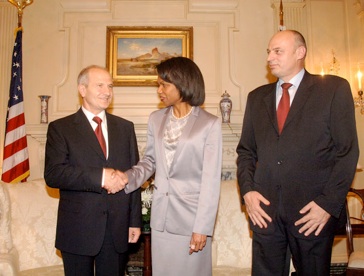
Condoleeza Rice meets Kosovo President Fatmir Sejdiu and Prime Minister Agim Ceku (left)
The Western Media: Disinformation concerning the Nature of the Kosovo government
The Kosovo government is tied into organized criminal syndicates involved in narcotics and human trafficking.
The fact that all three Kosovo Prime Ministers, Ramush Haradinaj, Agim Ceku and Hashim Thaci are war criminals has not been acknowledged in recent press reports regarding the Independence of Kosovo.
The EU and the US are supporting the criminalization of Kosovo politics.
Michel Chossudovsky is the author of the international best America’s “War on Terrorism” Second Edition, Global Research, 2005. He is Professor of Economics at the University of Ottawa and Director of the Center for Research on Globalization.
To order Chossudovsky’s book America’s “War on Terrorism”, click here
ANNEX
We bring to our readers attention two articles published in the Washington Times.
The first article published in May 1999 describes the KLA as a criminal organization. The second article published in February 2008 highlights the role of Prime Minister Hashim Thaci, a “former criminal” in the process of Kosovo independence.
Note the difference: The second article published in February 2008 contradicts the Washington Times’ coverage of the Kosovo war at the height of 1999 NATO bombings.
______________________________________________________
Ma perché Schauddinn era così importante per i “servizi” e quindi intoccabile? Molto semplicemente egli era l’ultimo anello di una catena di destabilizzazione mondiale controllata dalla CIA che aveva come compito principale quello di impedire l’avvento al potere dei comunisti nelle nazioni occidentali e nei paesi ricadenti nell’area di influenza degli USA, senza peraltro escludere anche interventi nelle zone di influenza sovietica.
La plurietnica Jugoslavia della fine degli anni ’80 era un paese comunista, seppur non allineato, in cui dopo la morte del suo leader Tito sempre più forti si erano fatte le spinte autonomiste. La Jugoslavia doveva essere portata nell’area di influenza occidentale, ma per fare questo era necessario disgregarla alimentando la secessione delle varie nazioni che ne componevano la Federazione. Bisognava quindi innescare la guerra.
All’inizio del 1991 Peter Rajic ex numero due delle dogane jugoslave constatava amaramente: “le armi che i trafficanti di droga importano in Jugoslavia, il volume di affari che essi trattano nell’Europa occidentale, ma anche in Ungheria e Cecoslovacchia, lasciano supporre che la guerra sarà di una violenza inaudita”.
Droga in cambio di armi
Nel 1991 il latitante boss mafioso Giovan Battista Licata si rifugiava in Croazia dove poteva condurre indisturbato una vita sfarzosa. Licata era un uomo di spicco del clan Fidanzati, ed in stretti rapporti con il capo della “mala del Brenta” Felice Maniero personaggio chiave nei traffici di armi verso la Jugoslavia. E proprio da un’inchiesta sulla “mala del Brenta” venne alla luce un traffico internazionale di armi russe provenienti da Israele e dirette al neonato esercito croato. Un affare da 50 milioni di dollari, gestito in accordo tra servizi segreti e mafia, nel quale sarebbero stati coinvolti personaggi importanti tra i quali il Console della Croazia in Slovenia Ivan Capitanovic, uomo di fiducia del presidente croato Tudjman.
L’inchiesta della Procura di Venezia portava all’arresto di sette persone ma il carico di armi svanì nel nulla. Dalla documentazione acquisita dalla magistratura risultava che le trattative per la compravendita delle armi si erano svolte tra Trieste, Klagenfurt, Lugano, e vi erano coinvolti alcuni cittadini americani. Il tutto sarebbe avvenuto con il “tacito consenso” dei servizi segreti israeliani.
Nell’inchiesta veneziana compare nuovamente il nome di Friedrich Schaudinn che insieme a Licata avrebbe svolto il ruolo di mediatore di armi tra Croazia e Israele. Coinvolti nell’indagine anche il console onorario del Rwanda in Italia e Riccardo Trombetta, capitano di complemento della brigata paracadutisti Folgore, indicato come presunto appartenente all’organizzazione Gladio con il ruolo di istruttore.
Quali erano i collegamenti tra Mafia e servizi segreti e su cosa si basavano gli scambi? Secondo un intermediario, Silvano Zornetta, si trattava di un vasto giro di droga che vedeva implicato l’imprenditore siciliano Carlo Bevilacqua. Bevilacqua, arrestato nel 1993 a Podgrad (Slovenia) mentre tentava di cambiare 20 banconote false da 100 dollari USA presso la banca di Ilirska Bistrica e scoperto in possesso di sostanze stupefacenti nella sua macchina, aveva solidi collegamenti professionali con alcune “particolari” società friulane tra cui la Megas srl e la Loans srl. La Megas srl era una finanziaria, fondata proprio da Bevilacqua, attraverso la quale operava la Friuldati di Pasian di Prato, paesino nella provincia di Udine in cui risultava esservi un centro di intermediazione per il traffico internazionale di armi in cui erano coinvolti anche uomini dell’allora KGB.
Bevilacqua era stato inoltre amministratore della Igc spa con gli avvocati Maurizio Folisi e Bruno Becchio e il commercialista Luigi Jannacone. Folisi con Becchio e altri nel corso di alcune conversazioni telefoniche intercettate dalla procura di Gorizia nel 1989 vennero indicati come agenti del KGB in affari con potenti esponenti della politica USA.
Gli inquirenti si erano imbattuti in uno dei tanti rami di quella che poi è stata definita dalla DEA come “The Balkan Route”: l’autostrada per l’ingresso della droga in Europa.
Questo commercio di stupefacenti in cambio di armi vedeva il suo epicentro nel Kosovo dove era controllato dall’UCK e dalla mafia kosovara con la copertura degli USA e dei loro alleati. Secondo John Whitley, analista di intelligence, la CIA e i servizi segreti tedeschi (BND) avrebbero appoggiato i ribelli del Kosovo e la Germania avrebbe avuto l’incarico di creare e finanziare l’UCK, mentre la CIA ebbe successivamente il compito di addestrare ed equipaggiare l’esercito di liberazione del Kosovo in Albania.
(Dal libro "Tracce di legalità")
Postato 1st May da Roberto Giurastante
______________________________________________________
martedì 4 dicembre 2012



uno stato-mafia: il Kosovo




